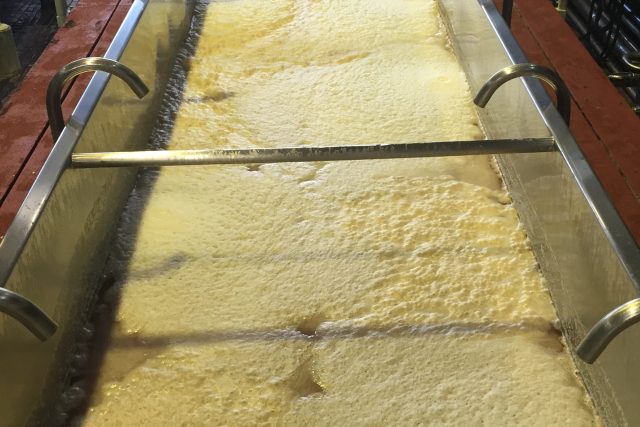Thornbridge to prove Britain’s brewing heritage can be profitable
Thornbridge’s Burton Union is looking to show big brewers Britain’s brewing heritage can be lucrative. Pete Brown reports.

It’s customary, in the world of any fandom, to champion the small, idealistic underdog and boo the big, evil empire or corporation. We’ve had a tendency towards Team David versus Team Goliath since the days of – well, David and Goliath.
In the interests of providing accurate commentary on the beer world, it’s a habit I try to resist. Not all small brewers are great, and not all big brewers are bad. With a gentle nudge, even the biggest, baddest brewers are capable of doing some good stuff.
And when a big brewer takes over a small brewer, the small brewer’s beer doesn’t automatically deteriorate. It took nearly eight years for AB InBev to spoil Camden Hells, for example.
Occasionally, big and small can work together to achieve something neither could alone. This week, it’s been announced that Carlsberg Marston’s Brewing Company (CMBC) has given a set of the famous Burton Unions to Thornbridge, and is helping the Derbyshire craft brewery get it up and running. This has sent some much-needed cheer through the craft brewing world.
Why does this matter?
Once upon a time, Burton-on-Trent was the most important brewing town on the planet. And by the middle of the 19th century, most beer in Burton was being fermented on the town’s eponymous Union Sets. The unions were a system of barrels, pipes and troughs, basically an adventure playground for fermenting yeast. The yeast had loads of fun, foaming through the pipes and running down the trough and back into the barrels from which it had spouted. The belief was that happy yeast made better beer.
Obviously, such a system was eccentric, archaic and costly to run. But it was part of what made Burton Burton. As brewers consolidated in the 1969s and 1970s, the bigger the owning company, the less essential the Unions seemed. By the end of the 20th century, everyone had got rid of them except Martson’s, who remained defiant. “Without the Unions, there would be no Marston’s Pedigree,” it had insisted to anyone who visited the “Cathedral of Brewing,” where the world’s last remaining Union Sets bubbled away.

Partner Content
In 2020, Marston’s entered into a “joint venture” with Carlsberg, which saw the Danish brewer take a 60% stake in the business. Of all giant brewing corporations, Carlsberg are arguably the most enlightened on a global scale. Its owned by a charitable foundation and does genuine good in the world. But it seemed to have a careless attitude to British ale brewing that was at odds with its undeniable contribution to the development of lager.
Sure enough, it didn’t take long for the multiple announcements of Marston’s-owned brewery closures to start trickling in. And in January 2024, CMBC announced the “retirement” of the Unions. Apparently, people who had been brewing Pedigree for decades on them had been wrong all that time about how important the Unions were.
So the deal with Thornbridge is great news. And it’s a sign of how the multi-layered world of big and small brewing can work. Carlsberg has another joint venture, with Brooklyn Brewery. Brooklyn’s brewmaster, Garrett Oliver, is great friends with Thornbridge. It seems it’s this connection that enabled the deal to take place.
But why is it important? Is there anything to this beyond the preservation of a museum piece, important though that is?
Well, here’s where it gets interesting. The reason given by CMBC for “retiring” the Unions is the seemingly unstoppable decline of the cask ale market. The Unions exclusively brew cask ale, and there’s simply not enough money in cask ale to justify using this expensive kit in its production. They have become, to quote CMBC, “unviable.”
And yet, the reason given by Thornbridge for taking on the Union set is that it will enable them to premiumise cask ale, to do new and interesting things in the space, and make more money from the sector.
If Thornbridge is right, CMBC must be wrong. If Thornbridge can use the Unions to premiumise cask ale and make it more interesting and profitable, why couldn’t CMBC, which has far more expertise in its use, and is currently teaching the noobs at Thornbridge how to brew on them?
We’ve been here before. Pubs are regularly sold off by big pub companies (pubcos) because they are “unviable.” I visited a small pub chain a few years ago which had bought a few of these “unviable” pubs from Britain’s largest pub company. Every one was now thriving. The owner told me how the former pubco area manager had recently been in for lunch with his boss, who bawled out his underling, shouting, “Why the hell wasn’t it this good when we owned it?”
I wonder if we’ll hear a similar sentence uttered in Burton-on-Trent, when the first union-brewed Thornbridge beers roll off the line?
Related news




